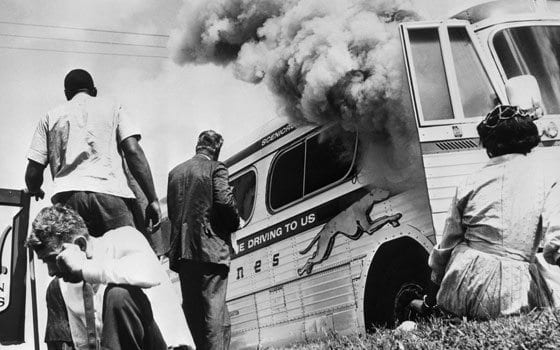

PBS’ ‘Freedom Riders’ revisits the days of Southern segregation – and the efforts to end it.
Fifty years ago, a group of students boarded two buses with the simple but revolutionary goal — to travel together from Washington, D.C. to New Orleans. The students, both black and white, wanted to confront brutal Southern segregation practices, which barred integrated travel.
Soon, they became known as the freedom riders.
Although the Supreme Court had officially struck down segregation on interstate travel nearly two decades earlier in the decision Morgan v. Virginia, Southern states did not comply with the new law, and the federal government was reluctant to enforce it.
But the freedom riders wanted to challenge the federal government to protect their constitutional rights — especially President John F. Kennedy, who up until that point had done little on the front of domestic civil rights.
From May to November 1961, more than 400 students — black, white, men, women, Northern and Southern — boarded buses headed to the deep South. The freedom riders risked their lives, enduring beatings, fire bombings and imprisonment for simply traveling together. But their sacrifices paid off, and on Sept. 22, 1961 the Interstate Commerce Commission officially ordered an end to segregation on buses and trains.
Commemorating the 50th anniversary of the courageous freedom rides comes the new documentary, “Freedom Riders,” produced, written and directed by award-winning filmmaker Stanley Nelson. The film will be broadcast next week as part of PBS’ “American Experience” series.
“The lesson of the Freedom Rides is that great change can come from a few small steps taken by courageous people,” Nelson said. “And sometimes to do any great thing, it’s important that we step out alone.” The filmmaker has also produced the historical documentaries, “The Murder of Emmett Till,” “Marcus Garvey: Look for Me in the Whirlwind,” and “Black Press: Soldiers Without Swords.”
The vivid film features recent interviews with many original riders, state and federal government officials who dealt with the riders and journalists who witnessed the events, as well as archival footage and scholarly commentary. Through these rich testimonies, “Freedom Riders” movingly illuminates this lesser-known piece of civil rights history, serving as a sharp reminder of the horrors of segregation and the power of courageous people to change it.
“Freedom Riders” also reveals the complexities of this history — like the freedom riders’ ongoing tensions with Dr. Martin Luther King Jr.; the long unwillingness of the Kennedy administration to stand up for black civil rights; and the views of the riders’ opponents.
Bernard Lafayette Jr., one of the freedom riders featured in the film, shared his own story with the Banner. A native of Tampa, Fla., Lafayette grew up under the grip of segregation. But for two years he lived in Philadelphia, where his parents briefly took jobs, and there had a “taste of what it was like” to live in an integrated society. He returned to the South with the potent idea that “we could have a different world.”
But one experience from his youth particularly moved Lafayette to take action. He was boarding a streetcar with his grandmother — and at that time, blacks had to pay the driver up front and board in the back. But some drivers would drive off with their money before they could board, so Lafayette and his grandmother would sprint to the back of the streetcar and quickly hop on board. One day, however, his grandmother tripped and fell; he then stood in the street stretching — one hand to keep the streetcar door open, the other to help his grandmother.
The moment left him thirsting for justice — immediate justice that his grandmother would experience, not just his grandchildren.
As a college student at the American Baptist Theological Seminary in Nashville, Tenn., Lafayette joined in sit-ins at local movie theaters and lunch counters. The success of these non-violent actions instilled in him the “motivation and confidence” to later become a freedom rider, leaving him with “no question” that the rides would also prevail.
And they did, ensuring that Lafayette’s grandmother would never face the same humiliation she did that day on the streetcar.
Now, Lafayette says he hopes the “Freedom Riders” film will inspire the next generation, what he calls the “curious generation.” Knowing the history he helped create 50 years ago is critical to combating the problems of today, he explained. “Things don’t have to remain the same,” and the freedom rides are powerful proof of that. While this history largely remains “another world” to the youth today, he believes the film “has done a tremendous job of depicting” it.
“I can’t see it enough,” Lafayette said of the film. “It’s an important contribution to humanity.”
Marking the 50th anniversary of the original freedom riders, the film “Freedom Riders” will premiere on Monday, May 16 at 9 p.m. on PBS. For more information, visit www.pbs.org/freedomriders.






